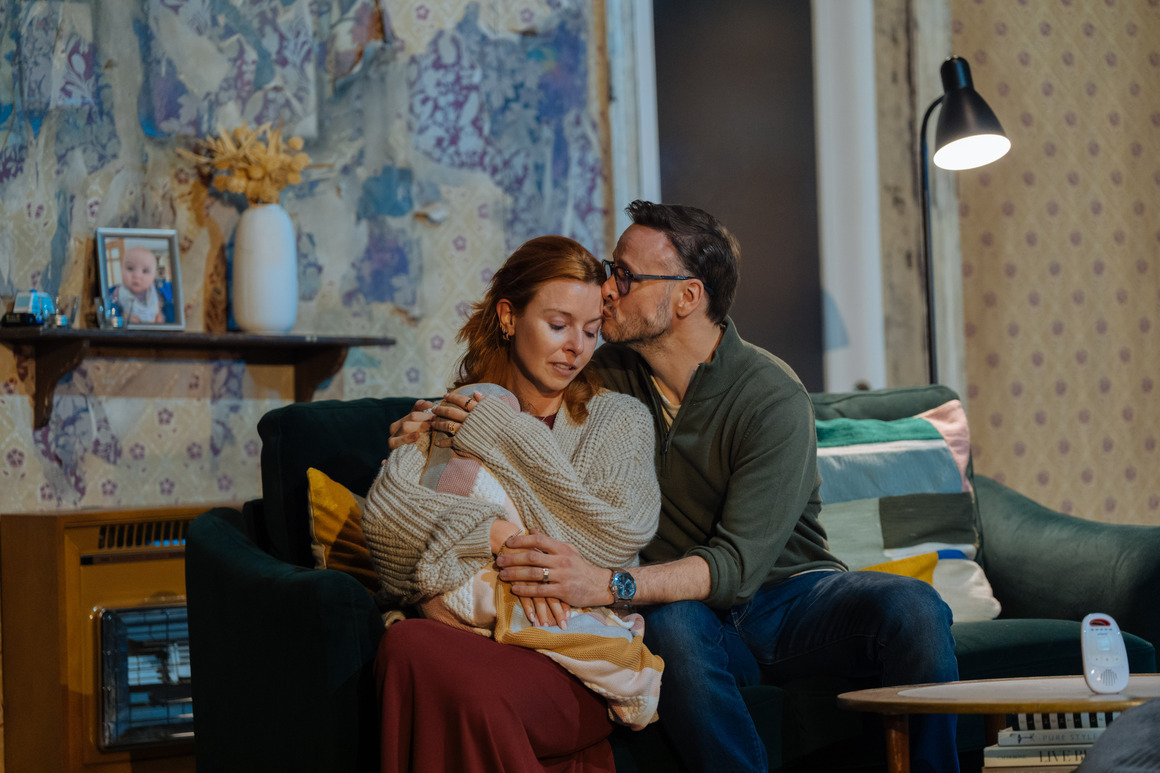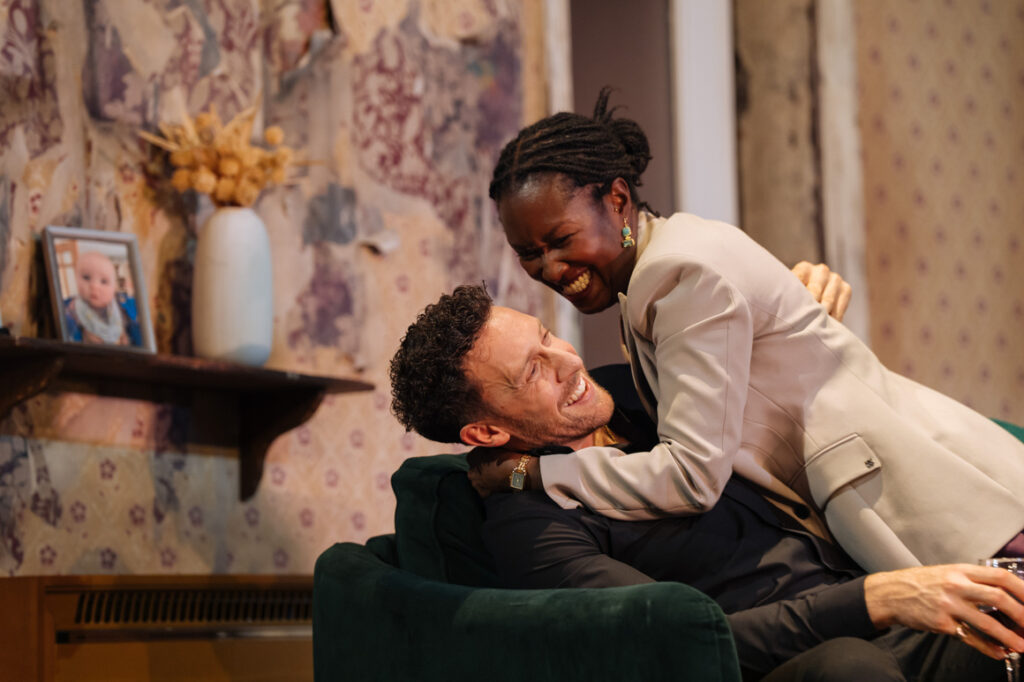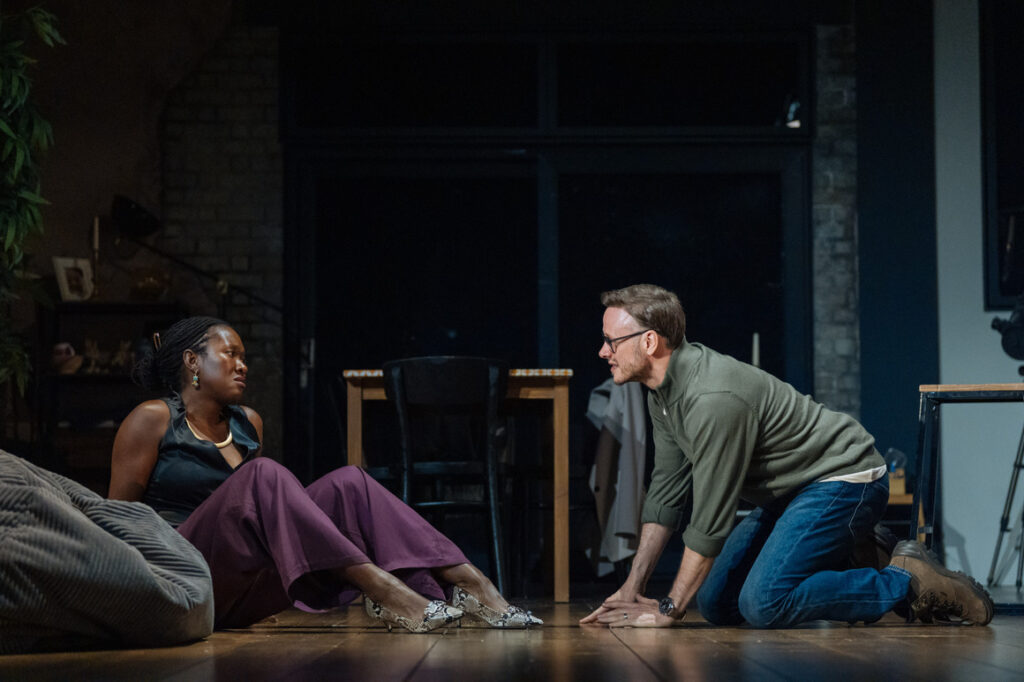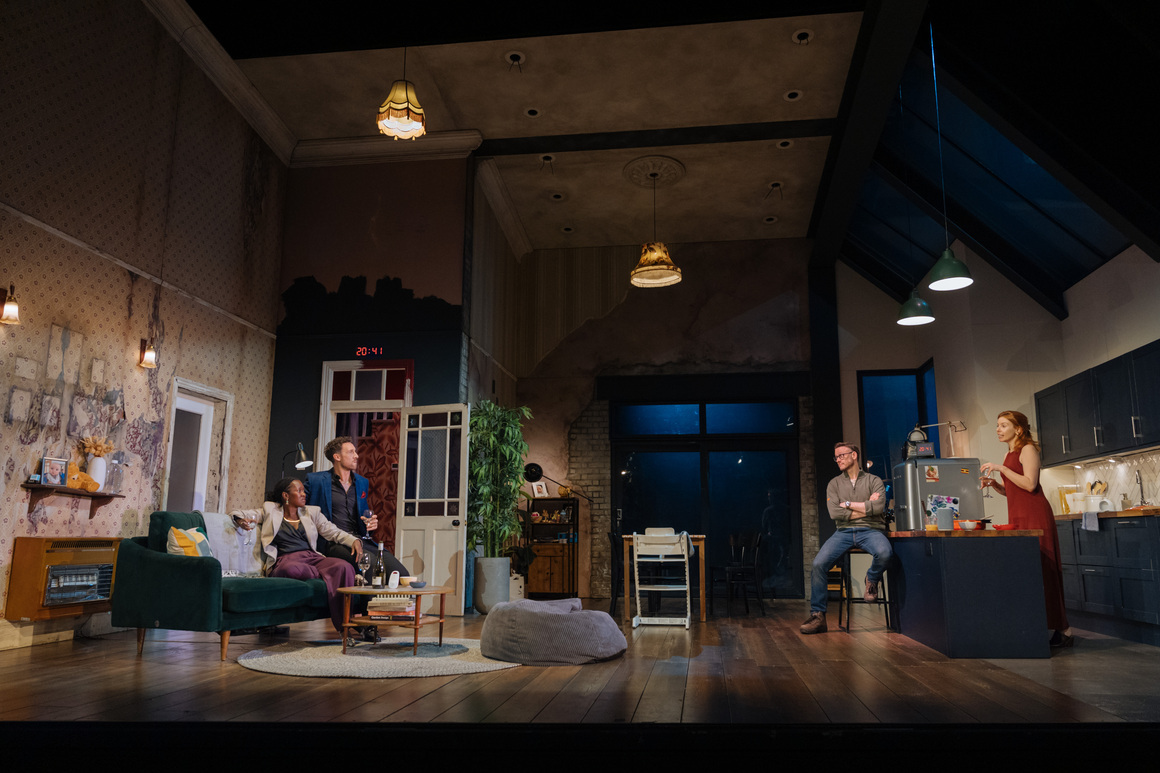Review by Simon Jenner, October 6 2025
★ ★ ★ ★
This came as a surprise. I don’t mean the ending, which really is a surprise. But for those of us seeing it again this play was far more satisfying than we expected. Danny Robins’ 2:22 A Ghost Story comes echoing screams from the West End where it premiered in 2021. Following its revival there in 2024 with Stacey Dooley making her stage debut, it now features her joined by partner Kevin Clifton. Their distinct characters shift the dynamics in this tight, always stimulating evening directed by Matthew Dunster and Gabriel Vega Weissman at Theatre Royal Brighton till October 11th, when it continues on tour.
Robins is intrigued by belief and disbelief; he freights his four-hander accordingly. It’s a witty dialogue-rich script, clean and prone to one-liners such as “Of course she believes in ghosts. She’s a Catholic.” And “Ghosts don’t like electricity. Like the Armesh.”

Stacey Dooley and Kevin Clifton. Photo Credit: Helen Murray
You can tell straight away this is a smart savvy work that expects us to get those references and laugh. And in Brighton no cast can be disappointed. Dooley makes Jenny her own. She’s more vulnerable with wells of fright and wounded feeling; more obviously under the away of her rationalist husband. Clifton’s not an obvious science lecturer but he’s fluent and brings (as you’d expect) a gallimaufry of shuffles and moves across the set. Discreetly. Vocally neither are ideally clear on occasion; but Dooley in particular conveys a soul: it’s clear exactly what she feels.
Thus new home owners, still uncertain of their possession, continually find themselves testing each other. Rational science lecturer Sam (Clifton) is repeatedly telling his ex-Catholic wife (whom you might say he’s groomed to atheism) Jenny (Dooley) not to worry that they’ve stripped out the home-made furniture that late Frank lovingly bestowed on the house they’ve bought. Baby Phoebe gurgles on a monitor upstairs. Sam’s prone to stripping out, burning, laying waste the old.
Sam’s old university friend Lauren (Shvorne Marks) has already arrived. She’s now an NHS psychologist. Long friendly with Jenny, she brings a surprising new boyfriend Ben (Grant Kilburn) in tow.
There’s a reason Lauren’s chosen men not remotely worthy of her, doesn’t tangle with the nearly-right ones. We find out why only late on. The three friends have history. Ben, a working-class builder who grew up in this area, is more sensitive to the nouveau-riche stripping out than you might think. And he’s sensitive altogether. We find out why he was exorcised at three. He certainly believes Jenny and her experiences of what goes on with 2:22, with Jenny’s offstage mother as witness. But as Sam says, she’s a Catholic.
Tension between the couples, between the three friends and a surprising reveal when the newcomers are alone, allow a certain richness. These people are recognizably individual. Not deeply-drawn but with enough backstory to allow other readings, other blind alleys.
And why do the outside doors not open from the outside? And when Lauren tells Jenny fear is so powerful it overcomes love, and Jenny says she’d never leave Phoebe behind, why do you worry?
So why aren’t there most ghosts haunting the oncology units? And this assertion that most ghosts haunt their homes when they died elsewhere is surely rubbish. Quite a few theories are advanced. Robins has thought through answers and supplies his own uncertainty. Jenny’s point, that the stars Sam exalts are messengers of their own afterlife, long after their extinction, is a clincher Sam can’t evade.

Grant Kilburn and Shvorne Marks. Photo Credit: Helen Murray
Marks brings something near this in her relation of a childhood friend and parakeets, and in her longing. Exchanges with Clifton too are charged. It’s where she peels a melancholy tinged with desperation at one point that tells you all you need to know.
The script allows three characters to narrate their own tales. A little like Conor McPherson’s masterpiece The Weir. But this is different. The stories have their own history of telling, particularly Lauren’s. With the plot skilful enough to take us into many indirections, the end genuinely is a surprise.
Anna Fleischle’s set of an eviscerated glass-patio’d kitchen replete with digital clock and working surfaces (just how many you’ll find out) is a strong solid presence. It’s chilly, designed by a scientist with no input from Jenny who hates the glass doors. Lucy Carter’s lighting is the most prominent with its red surround flicking on to Ian Dickinson’s scream sound.
The need to consistently add screams to the red-out (it’s a lighting design like many now taking its cue from Miriam Beuther’s white one, used for instance in The Father) seems one indirection too many. Even if they do alternate with foxes mating, lights flashing on. One is gratuitous, creating a wholly artificial break, since there’s no real climax.
The ensemble’s strength is anchored by Kilburn’s layered Ben. His resentment at being patronised by Lauren and her smart friends has answers they may wish to attend. His relation of how he was indued with 1940s songs with all the inflections has a genuine reach; and his aria of regret over the eviscerating professionals who suck out each house in his old neighbourhood carries a true charge.
Clifton has the unenviable job of appearing always smart, petulant, like some M. R. James professor riding to a fall. And you expect it. But. Dooley manages a quiet then earned desperation, always anchored to her child, the one who after all demands a vigil. Her recrudescent Catholicism triumphs over Sam’s imposed star-void. Marks’s progressively drunken Lauren is meant to get louder, and calibrates it perfectly. Kilburn brings welcome vocal chill.
And what of actors Rochelle Harvey and Paul Sockett? You might not see this coming. An excellent night out. Sharp, satisfying in itself, above all hauntingly intelligent in its questions.
Directed by Matthew Dunster and Gabriel Vega Weissman, Set Design Anna Fleischle, Costume Designer Cindy Lin, Lighting Designer Lucy Carter, Sound Design Ian Dickinson for Autograph, Casting Matilda James CDG, Annelie Powell CDG, Illusions Chris Fisher, Fight Directors Rachel Bown-Williams and Ruth Cooper-Brown of RC-Annie, Vocal Coach Hazel Holder, Production Managers Matt Ledbury & Esme Driscoll
Performance Management Runaway Entertainment Associate Director Jess Daniels, Performance Marketing Sine Digital, Graphic Design Muse Creative, Press Bread and Butter PR, Marketing Sales and Ticketing EMG, Performance Marketing Sine Digital.
Stage Management Jamie Gibson, Nathan May, David McEvoy, Callie Roebuck, Liam Search, Jess Shale, John Wnnacott, Paris Linxuan Wu.
Photo Credit: Helen Murray.
Shvorne Marks and Kevin Clifton. Photo Credit: Helen Murray



